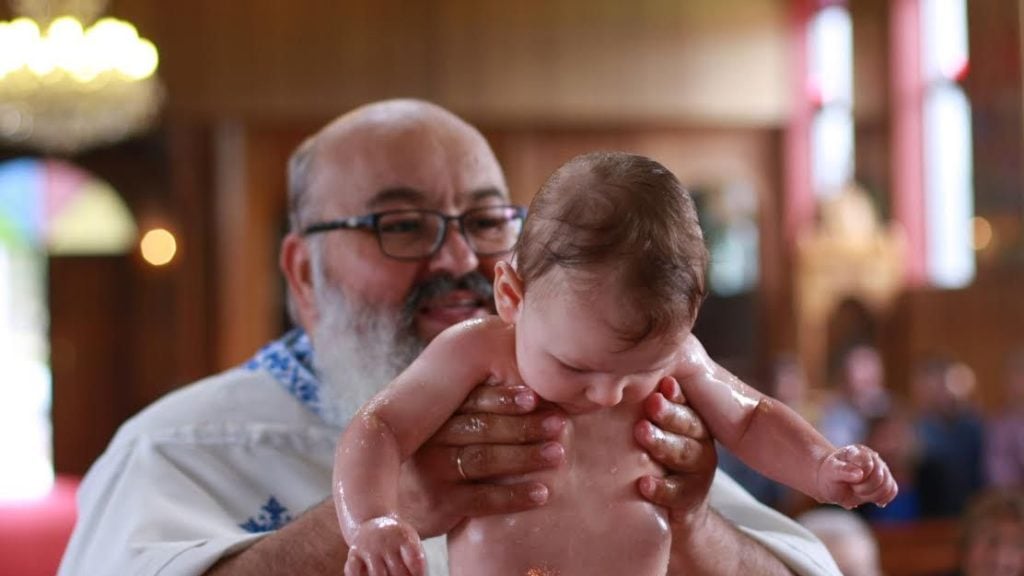It was time to baptise our son in the Greek Orthodox Church. He was now 10 months old, and I knew the priest wouldn’t be pleased; he preferred babies to be younger, they were ultimately more accommodating between his slippery, olive oily fingers. But my wife and I had a problem: we couldn’t find a godparent.
In order to be an Orthodox godparent, numerous boxes need to be ticked. The main requirements are that the person be at least 12 years old and baptised in the Eastern Orthodox Christian Church. In our case, this limited the number of candidates.
Despite being Greek Australian, I didn’t have many friends of similar heritage, while my Australian wife had even less. And while not explicitly prohibited, siblings and cousins are discouraged since baptism is seen as a chance to welcome someone new into the family.
In the end, we decided on one of my childhood friends. I’d known him some 40 years; nearly my whole life. He always asked how our son was doing, how sleep-deprived my wife was, and he even helped out my elderly parents when I lived overseas. My mum was especially overjoyed. It was finally a chance to link our two families, at least symbolically, after she’d known his parents for 60 years. My wife and I were happy with the choice too.
And so, I visited my friend to share the good news. As my son rolled and dribbled on the carpet beneath our feet, I shook my old friend’s hand warmly.
“Congratulations,” I said, “you’re looking at your new godson.”
I expected a smile, a masculine embrace, a moment of genuine joy, perhaps even a toast. But instead, I was left dumbfounded.
“Pete, I’m honoured, and I’d love to, but I can’t. I’ve already baptised girls, which means I can’t do boys.”
It took me a moment to process what he meant. In the eyes of the Church, baptism creates blood relations, so if two of the children that a godparent baptised one day sought to get married, this would effectively be considered ‘incest’, and not be permitted. This is why there was a rule against baptising both genders – to avoid such situations.
My friend’s rejection came as a shock. I understood the rationale behind it, but the rule about baptising only one gender now seemed antiquated, and especially at a time when same-sex marriage was being recognised, at least legally. The rule stemmed from a bygone era when people lived their whole lives in small villages and married the boy across the road or the girl at the corner shop. It once made life practical, but now only seemed to make things impractical, especially in a multicultural, multifaceted society.
“Are you sure this gender rule still applies?” I asked my friend.
“It did 10 years ago,” he replied. “My cousin had asked me to baptise his son. I checked with the priest and he said no.”
We had a new priest now, who was much younger, used email, and even posted church programs to social media. I went away and fired off a query; the priest replied within the hour saying he would check with the bishop in Sydney.
I explained things to my 87-year-old mum, herself an avid churchgoer. She was understandably disappointed but also equally surprised. She said Dad had baptised both boys and girls, and that was 50 years ago. Dad respected the Church, but he was never one to let it dictate his life, particularly when he had the chance to become a much-admired nouno.
The priest emailed me the next day.
“The bishop said there is no problem for someone who has baptised girls to baptise a boy, or vice versa,” he wrote. “There is even an official letter from the Orthodox Patriarch in Constantinople.”
I went back to my old friend, told him the good news.
“Sorry,” he said, “but my decision remains the same, I hope you understand.”
I must admit: I didn’t. Here was the Church trying to be progressive, to move in step with the modern world, and still its parishioners clung to the old ways. I didn’t understand my friend’s decision, but I respected it.
The night before the baptism, my brother called from our home in Greece, a small rural town in the north. I asked whether godparents could baptise both boys and girls there. “Definitely,” he replied. “My own nouno absolutely baptised girls. And he was also only seven years old when he baptised me. To this day, we’re still close friends.”
After some time, we found a new godparent, who was actually my godsister’s son. At 19 years old, he was ecstatic at the prospect of being a first-time nouno. He immediately wanted to know my son’s birthday and promised to teach him sport when he was older. My ageing footballer’s knees were silently grateful.
“There was once also a rule that a godchild couldn’t marry until their godparent did,” my brother had said. “I see the logic behind the gender rule, but some rules just make no sense whatsoever.”
The baptism went off without a hitch. We welcomed an array of friends to our church – Australian, Greek, Fijian, Iranian, Norwegian, Chinese, Italian, Pakistani, Christian, Islamic, Hindu, Judaist, atheist, straight, gay, lesbian – who together marvelled at its wonderfully ornate interior and the sanctity of the ancient baptism ceremony.
For me, baptism isn’t so much about religion as it is tradition, and it was special to share the day with so many good friends. This included my old friend, who was pleased with our new choice of godparent. So were we.
And in the cool and airy church, our naked, newly-baptised son even peed on his godfather as he held him in his arms. This is apparently good luck.










